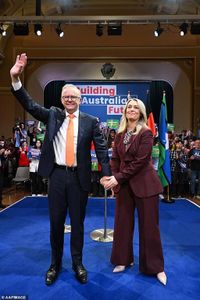As the federal elections approach in Canada and Australia, political analysts are closely watching voter sentiments and party standings that could shape the future of both nations. In Canada, public relations expert Jeremy Ghio has made it clear that Ontario will be pivotal in determining whether the next government will be Liberal or Conservative. Meanwhile, in Australia, recent polling suggests a significant lack of confidence in Coalition leader Peter Dutton's ability to lead the country.
According to Ghio, the outcome in Ontario is crucial. He stated, "Ontario will decide the color of the government," emphasizing the importance of the province in the upcoming election on April 28, 2025. He noted that Quebec and British Columbia will play a significant role in deciding whether the government will be a minority or majority. The Conservative leader, Pierre Poilievre, has been actively campaigning in Ontario, but Ghio warned that without strong support in the Greater Toronto Area, it would be nearly impossible for him to form a government.
Recent polling data from Léger shows the Liberals with an eight-point lead over the Conservatives, indicating a challenging landscape for Poilievre. Ghio explained that for the Conservatives to have a chance at a minority government, they need to be at least 3 to 4 points ahead of the Liberals. He also pointed out a concerning trend: a decrease in support among men and young voters, which could further complicate the Conservatives' path to victory.
In contrast, Liberal leader Mark Carney has maintained his lead in the polls despite facing controversies, including a poorly translated slogan and criticism regarding his financial framework. Ghio remarked that the election campaign has been somewhat stagnant, with no significant shifts in voter preferences. He noted, "Mr. Léger said it has been a useless campaign from a polling perspective because we haven’t seen any crossover, we haven’t seen any change in leaders during the race, and that’s very rare to see." This stability may indicate a reluctance among voters to shift their allegiances.
Ghio also suggested that Canadians may harbor fears of a Donald Trump-style populism, which could be influencing their views on the Conservative campaign. He stated, "If the Liberals win on Monday, Canadians will have largely rejected the populist style of Donald Trump." This sentiment could be pivotal as voters head to the polls.
Meanwhile, in Australia, a new poll reveals that many voters are not convinced Dutton is the right person to lead the country. As the May 4, 2025 election approaches, nearly half of those surveyed expressed that they do not want Anthony Albanese to serve a second term as Prime Minister. Dutton's approval rating has plummeted to a new low, reflecting a broader dissatisfaction with the Coalition.
According to a report in The Australian, neither the Labour nor the Coalition parties saw a change in primary support in the last week of April 2025. The Labour party's primary vote remained steady at 34%, while the Coalition's support was slightly higher at 35%. However, this represents a decline from their previous election results, suggesting that neither party has successfully engaged voters in the lead-up to the election.
In May 2022, Labour was elected with a primary vote that was lower than expected, and the current 34% marks a slight improvement of 1.4% from that election. Conversely, the Coalition's primary vote has decreased from its last electoral result of 35.7%. The latest findings indicate that 48% of respondents do not want Albanese re-elected, while only 39% believe he should lead the country again. Despite these numbers, Albanese has seen a five-point improvement since February 2025, indicating some regained support.
However, the news is not encouraging for Dutton. There has been a seven-point increase in the percentage of voters who do not believe he is ready to become Prime Minister, rising from 55% in February to 62% now. Voter confidence in Dutton is low, with 66% stating they do not think the Coalition is ready to lead the country. Among male voters, 58% expressed similar doubts about the opposition's readiness.
As the election date nears, support for minor parties has seen some shifts, with Pauline Hanson’s One Nation increasing to 8% and the Greens decreasing to 11%. The latest survey, conducted between April 21 and April 24, 2025, included 1,254 Australian voters and reflects a growing desire for change among the electorate.
In the final televised debate on April 27, 2025, Albanese and Dutton faced off, with Albanese being declared the winner of the first debate. No winner was announced for the second debate, while Dutton was said to have narrowly won the third debate on April 22. These debates may have a lasting impact on voter perceptions as they finalize their decisions.
With both Canada and Australia gearing up for pivotal elections, the stakes couldn't be higher. In Canada, the outcome may hinge on Ontario's voters, while in Australia, the electorate appears to be searching for a leader they can trust. As these nations head to the polls, the results could reshape their political landscapes significantly.




